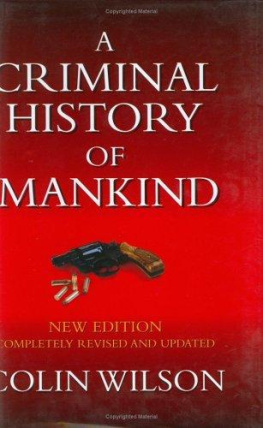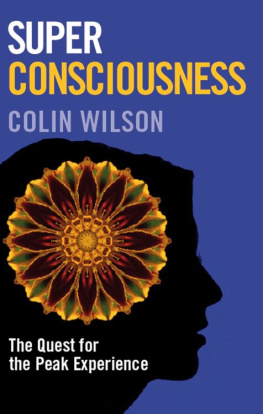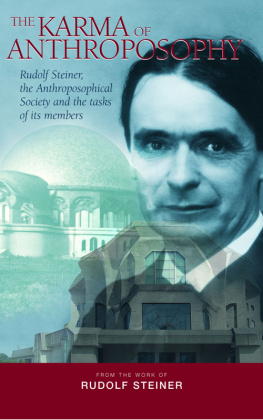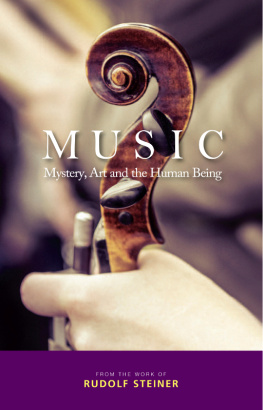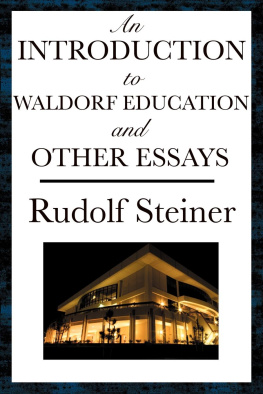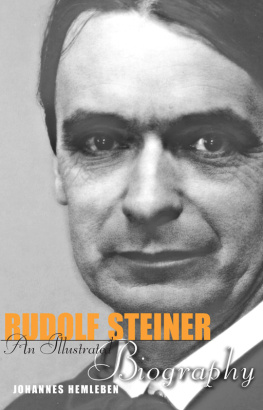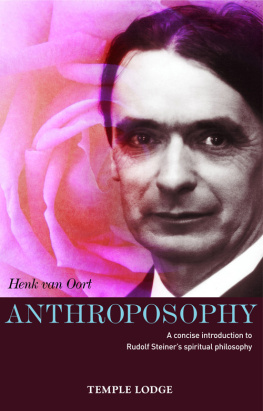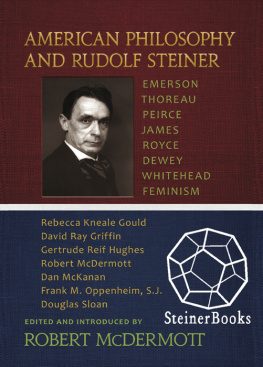Other titles by Colin Wilson available in this series:
C.G.JUNG: Lord of the Underworld
G.I.GURDJIEFF: The War Against Sleep
ALEISTER CROWLEY: The Nature of the Beast
The Strange Life of P.D.OUSPENSKY
RUDOLF STEINER
The Man and his Vision
by
Colin Wilson
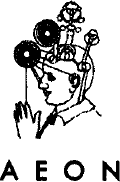
Originally published by The Aquarian Press 1985
This edition published 2005 by
Aeon Books Ltd
London W5
www.aeonbooks.co.uk
Colin Wilson
The moral right of the author has been asserted
All rights reserved. No part of this book may be reproduced or utilized in any form or by any means, electronic or mechanical, without permission in writing from the publisher.
British Library Cataloguing in Publication Data
A C.I.P. is available for this book from the British Library
ISBN 1 904658 26 1
Printed and bound in Great Britain
Contents
Acknowledgements
I WISH to express my gratitude to members of the Anthroposophical Society in Great Britain and particularly to Mrs E. Lloyd, who used to run the Steiner Bookshop at Museum Street, London WC1. I also wish to thank John Bowyer for providing me with material and for many helpful suggestions and Eileen Hutchins for her interesting comment on the problem of Steiner's vision of King Arthur at Tintagel.
It need hardly be emphasized that the members of the Anthroposophical Society who have offered their help should be in no way held responsible for the views expressed in the present book.
I also wish to thank the London Library, and in particular Christopher Hurley, for valuable help.
I also owe a debt of enormous gratitude to Dan Lloyd, who sent me invaluable photostat material of lectures by Steiner not published in English.
One
The Door to the Inner Universe
OF ALL the important thinkers of the twentieth century, Rudolf Steiner is perhaps the most difficult to come to grips with. For the unprepared reader, his work presents a series of daunting obstacles. To begin with, there is the style, which is formidably abstract, and as unappetizing as dry toast. But a determined reader could learn to put up with that. The real problem lies in the content, which is often so outlandish and bizarre that the reader suspects either a hoax or a barefaced confidence trick. Books like Cosmic Memory , with its account of Atlantis and Lemuria, seem to belong on the same shelf as titles like Our Hollow Earth , or My Trip to Venus in a Flying Saucer . The resulting sense of frustration is likely to cause even the most open-minded reader to give up in disgust.
This was, I must admit, my own experience when the publisher of the present volume approached me in the mid-1970s and asked me to write a book on Steiner. I accepted because I had always found Steiner an interesting figure. I first came upon his name in my early teens; it was in a remarkable book called God Is My Adventure , by Rom Landau. Landau begins his account by describing the experience of a certain Baron V, a German officer with whom the author became acquainted during his student days in Warsaw. The Baron was a member of a flying corps on the western front in the First World War, and he developed a disturbing psychic faculty: the ability to foretell which of his comrades would be killed when they flew out on a mission. This gift of prophecy threatened to wreck his health, so when he was advised to go and see a certain Dr Rudolf Steiner, he seized the idea with relief. Dr Steiner proved to be a quiet man with deep-set eyes, and he advised the baron to practise certain simple mental disciplines. These had the desired effect, and the unnerving gift vanished.
Landau's account made it clear that Steiner was no charlatan messiah; whenever people met this calm, serious man and heard him speak quietly and sensibly about the spirit world, they felt he was speaking from direct experience.
Over the years, I had picked up many copies of Steiner's books in second-hand shops. I had dipped into them, but found the style off-putting. I promised myself that one of these days I would settle down to a systematic study of Steiner's ideas, and the publisher's offer seemed to be the opportunity I had been waiting for. So I accepted, and blew the dust off the dozen or so volumes of Steiner on my bookshelves.
There seems to be a general agreement that An Outline of Occult Science is Steiner's most important book, so I started with that. It begins by acknowledging that occult science is regarded with suspicion by many people, a danger to weak minds. It goes on: All occult science is born from two thoughtsfirst, that behind the visible world there is another, the invisible world, which is hidden from the senses, and from thought that is fettered by the senses; secondly, that it is possible for man to penetrate into that unseen world by developing certain faculties dormant within him.
So far, so good. After another ten pages of introductory matter, Steiner launches into a chapter on the nature of man. And its opening paragraph proceeds to repeat what he has already said more briefly and effectively:
Considering man in the light of occult science, we are at once reminded of its general characteristics. It rests upon the recognition of a hidden something behind that which is manifest to the outer senses and to the intellect brought to bear upon their perceptions. These senses and this intellect can apprehend only a part of all that which occult science unveils as the total human entity, and this part is what occult science calls the physical body.
I was already becoming irritated by this repetition of the words occult science, and by what sounds like an attempt to impress by sheer wordiness (this part is what occult science calls the physical body; why not just: i.e. the body). He goes on:
In order to throw light on its conception of this body, occult science at first directs attention to a phenomenon which confronts all observers of life like a great riddlethe phenomenon of deathand in connection with it occult science points to so-called inanimate nature, the mineral kingdom. We are thus referred to facts which it devolves on occult science to explain, and to which an important part of this work must be devoted.
Gurdjieff's followers suspect that he wrote certain workslike Beelzebub's Tales to his Grandson in a deliberately complicated style, to force the reader to make enormous mental efforts. I wondered at first whether this was Steiner's intention: to weed out the lazy. But further reading makes it clear that this is Steiner's natural way of expressing himself.
I persevered for another week, reading various other works by Steiner: Theosophy, Knowledge of Higher Worlds, Christianity as a Mystical Fact , and finally gave up. I wrote a regretful line to the publisher telling him that, with the best will in the world, I just couldn't go through with it. In large doses, Steiner simply infuriated me. The publisher was perfectly amiable about it. He approached that brilliant cultural historian of the occult underground, James Webb, who agreed to write the book.
Alas, Webb began to show signs of mental instability in 1979, and on 8 May 1980, he committed suicide with a rifle. Webb and I had been in correspondence over the years, and I was saddened by his death. I also found myself wondering whether his attempt to digest hundreds of yards of Steiner's woolly prose had anything to do with his suicide. Webb's own drily ironic account of Steiner in his book The Occult Establishment (1976)in a chapter entitled Ginungagappmakes it clear that his book would have been written from the viewpoint of an unbeliever.
Next page



